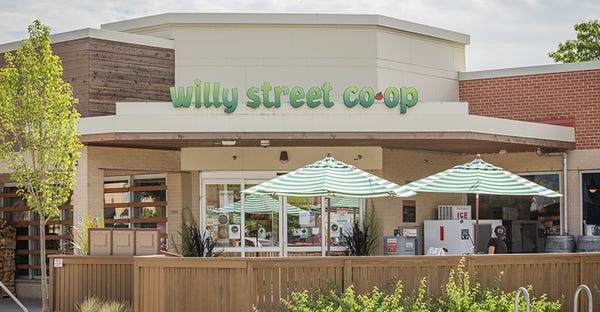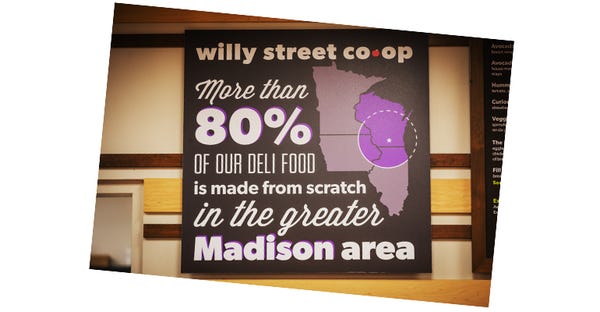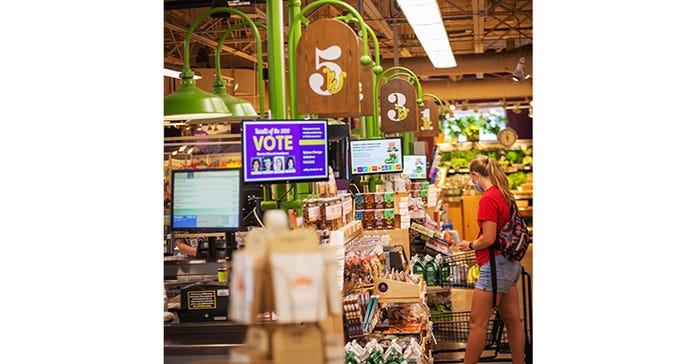August 21, 2020

In and around Madison, Wisconsin, Willy Street Co-op is a treasured institution. With three locations and nearly 36,000 owners—a whopping 9% of the metro area population—the co-op is beloved for its high-quality offerings, inclusive spirit and steadfast support of local producers from Wisconsin’s lush, rolling farmlands. The organization invests heavily in the neighborhoods it serves and works hard to give more community members access to healthy natural and organic food.
When the threat of COVID-19 first emerged, co-op leadership acted fast to ensure all staff and shoppers stayed as safe as possible. Navigating the pandemic has been challenging food retailers nationwide, but the Willy Street team has pulled together, taken care of one another and stayed strong on the front lines to keep the community fed and feeling supported.
NFM recently spoke with Anya Firszt, general manager; Kirsten Moore, cooperative services director and project manager for the co-op’s COVID-19 response; and Brendon Smith, communications director, about Willy Street’s far-reaching impact both during this public health crisis and in more stable times.

What do owners most appreciate about Willy Street Co-op?
Anya Firszt: We’re best known for our fresh produce and signature deli, prepared foods and bakery goods, as well as for vetting products. Our stores are small compared to other grocers, so real estate on shelf is at a premium. Our category managers and buyers go through great effort to ensure we carry products that customers are interested in and that fit the [ingredient] criteria we stand behind.
We also provide great worth to the neighborhoods surrounding our stores in terms of sponsorships for neighborhood festivals, organizations and food pantries. We have a generous donation budget and support our community reinvestment fund, started in 1992, for which abandoned equity is returned to the community through grants awarded to organizations.
Kirsten Moore: We’ve given back $477,000 so far.
How does the co-op extend natural and organic food to all?
Moore: Since 2010, we’ve had our Access Discount Program for co-op owners with a financial hardship. If they use WIC or FoodShare QUEST, which is Wisconsin’s SNAP program, or participate in a public or private program designed to address financial need or food security—or if their income is below 150% of the federal poverty guideline—then they qualify. The program provides 10% off all groceries and lets them pay off their equity over a 14-year period at $4 per year.
At the beginning of the pandemic, we increased the discount to 20% and could afford to continue that through the end of our fiscal year. This allowed us to give people more relief, which was nice because they were shopping less but trying to do larger shops at once.
We also take part in Madison and Dane County’s Double Dollars program. It started at our local farmers markets, and then in 2016, the city and county invited us to pilot at retail from October through May. If a shopper uses FoodShare QUEST at the co-op during Double Dollars season, we match what they spend up to $20 and give them vouchers for produce, edible seeds and seedlings for plantings.

Natural Foods Merchandiser: How does Willy Street support Wisconsin farmers and other local producers?
Firszt: We have very strong relationships with them. About 25 years ago, we began partnering with local farmers and contracting for products so that they weren’t all growing the same things. We continue to meet with farmers every January and February—they let us know what they’re interested in producing and we let them know what we’re interested in purchasing.
Moore: In fiscal year 2019, almost 36% of the products we purchased were local, and we paid out $6.6 million directly to local vendors in 2019. That doesn’t include locally based distributors—just producers we work with directly.
Let’s talk COVID-19. When did you realize you needed to take action and how did you respond?
Moore: The last two weeks of February is when we really started looking at what could happen. We started with a small team looking through sample documentation for what we needed to be thinking about for pandemic and disaster planning. That group started with four or five people and eventually became the majority of our management team meeting to plan our response. When things rapidly changed in the first weeks of March, we were a bit ahead, but not very, so we had to jump into the pool with both feet.
Firszt: Throughout this whole pandemic, Kirsten has stepped in as project manager, and we wouldn’t be in the position we’re in now if she hadn’t led this effort. She has demanded information and known how to disperse it to staff and owners. I don’t think she or Brendon has taken more than a weekend off in months. They’ve come into the office and been on top of this whole situation, and I know we wouldn’t be where we are without their diligence.
Was there a rush of panic buying initially before business tapered off?
Firszt: There were two weeks in March where we had record sales. We barely had enough time to get product off the truck, into the back room and onto the shelves before it was purchased. After that surge, sales cut back and it took a while to rebuild inventory on the items people bought up. But we’ve had steady traffic flow ever since. Basket size has doubled, but customer count is cut at least in half, so people are shopping less but buying more per visit.
Willy Street piloted online ordering and delivery at the North location not too long ago. How had that been going before COVID-19 and how is it working out now?
Firszt: E-commerce had been doing just OK. We had some challenges, and it took us a while to get things onboard. But COVID-19 brought a whole new need for this service, and I’m still in awe of how our entire e-commerce team stepped up to change from 10 or 12 orders a week to up to 300. It was an amazing testament to how, if really put to the test, we can step up and deliver groceries.
It was not easy, though. We didn’t have enough vehicles to address demand, so we partnered with Union Cab until we bought a third van. Now that more staff have come back from leave, we are better equipped to do delivery. We also expanded to include curbside pickup at all stores, which we hadn’t offered before.
Brendon Smith: And we developed a monthly subscription for a weekly box of seasonal organic fruit or local vegetables available for pickup. It costs $100 per month, and each box has $30 worth of product. We were a little concerned about the vegetable box conflicting with CSAs, but we asked FairShare CSA Coalition if they had any concerns. They said no, as they were getting low on available slots, so local farmers have really appreciated this program.

What actions have you taken to protect staff and shoppers in-store?
Moore: We reduced our hours to 8 a.m. to 8 p.m. because we have more robust cleaning regimens than we used to, and it’s hard for staff to clean, stock groceries and have customers in-store all at the same time. We haven’t reduced staff’s total hours, but we’ve limited the amount of time they’re exposed to customers. Also, before 10 a.m. is reserved for seniors and people who are immune compromised so they can shop at the cleanest part of the day. The North store doesn’t open until 9 a.m. because we need extra time to ring e-commerce orders.
We still don’t have any self-service, and we’re limiting customers in-store to 30, which, with staff, comes out to just under 25% capacity. To social distance, we have every other cashier lane closed. We started requiring face coverings for employees in April and for customers in late June because, as the county started the reopening process, we noticed fewer customers wearing face coverings, which made employees and other shoppers nervous.
What has this experience been like for your team?
Firszt: Our staff has done a great job of dealing with the added stresses. Their daily operational tasks changed a lot in March and sometimes changed from one day to the next. We’ve offered time off when they’ve needed it, and at the early onset of the pandemic, we had as many as 80 people out on leave. The folks who’ve continued to work have been amazing—and those folks at home are also amazing, as they have issues to address at home and have been taking care of their families.
Our staff has also helped us navigate this experience. A few were invited to participate in our COVID-19 response team. They helped us talk through issues and shared their concerns, and the team pulled together and worked on solving them. One of first things they asked for and we responded to was installing plexiglass in front of the cashier stands, customer service booths and juice bars. I don’t think that stopped all of the anxiety that comes with this, but we hope it has helped some.
How have you kept connected with owners and the community through the pandemic?
Smith: We’ve relied on social media and our website and newsletter more than in the past. We’ve been brainstorming some fun virtual things to do for National Co-op Month in October. We think there are opportunities to have a good time and reinforce the idea that we are one big co-op with a bunch of owners connected, even if we can’t see each other in person at a party like we’d usually have. We still want to celebrate co-op owners and say, “We’re all cooperating in this, and isn’t this a great thing we’ve all built together?”
About the Author(s)
You May Also Like
.png?width=700&auto=webp&quality=80&disable=upscale)




